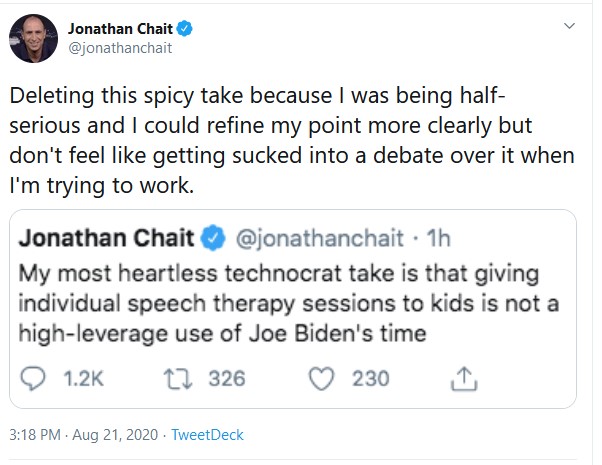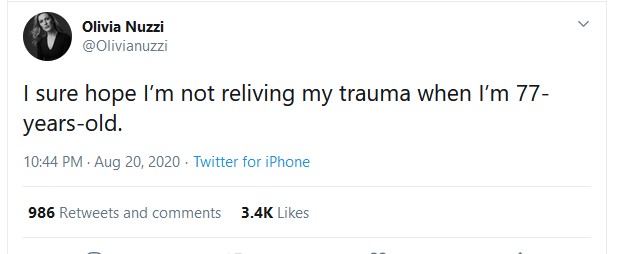The moral turpitude from the monsters who crawl on Vesey Street was very well-known in the five boroughs even before the pandemic. Just before any New York Magazine staffer entered a venue, the bartender would clang a bell and announce to the barflies with a stertorous holler that they could stay at the bar at their own peril. The door would open with an ominous squeak and the bartender would distract the vicious predatorial arriviste with charm and, if necessary, a free drink to avoid an Adam Platt takedown. It wasn’t always easy to appeal to the New York contributor’s narcissism and barracuda-like hello in these first vital minutes. But the bartenders did a decent job, even when their lives sometimes ended that very night.
The bartender’s honorable distractions usually offered you a few minutes to give the New York contributor the slip. You’d flatten bills on the bar, placing them just under the check presenter, and then you’d discreetly walk away, hearing the bloodcurdling sounds of the New York writer planting his vampiric fangs into the bartender (along with the bartender’s helpless screaming). You hoped that the generous tip would be enough to help cover the bartender’s funeral expenses. We New Yorkers do try and look out for each other.
Or, to put it a less inventive way, approximately 85% of the people who work at New York Magazine have the moral instincts of a striped hyena.
This is all common knowledge in media circles. Actual facts.
The striped hyena will often pretend to be dead when attacked and will stop at nothing to attack anyone — even a predator of greater size — in a dispute over food or, in this case, the expression of needless cruelty. Follow any New York contributor who gets pushback for a vile and disproportionately callous tweet and the New York contributor will pretend as if she is dead and not there. Which is precisely what Jonathan Chait and Olivia Nuzzi did in the last few days, of which more anon.
You see, these contributors are secretly savoring your attention in their notifications! They’re converting your likes and favorites to justify why their mediocre thoughts should translate into regular television appearances! They are forwarding all of it onto editor-in-chief David Haskell to prove — in an age of heightened media layoffs that always wound the wrong people — just why they should remain employed after writing such garbage hot takes as “Why Liberals Should Support a Trump Republican Nomination” when they’re refusing to disclose their conflicts of interest. (Jonathan Chait’s embarrassingly smug and insufferable article, which seriously suggested that Trump’s Presidency would follow the flagstones established by Arnold Schwarzenegger as California Governor, was rightly named one of “the worst takes of the 2010s” by The Outline.)
chait update: he has deleted the BOFA tweet which, as i understand it, is a felony in every state pic.twitter.com/t2GyarxaeK
— Ashley Feinberg (@ashleyfeinberg) July 13, 2018
New York contributors — specifically, the sophomoric and sociopathic pundits Jonathan Chait and Olivia Nuzzi — represent a repugnant breed of amoral Chuck Tatum types who view real life as a joyless sudoku puzzle to be filled in with superficial findings. Chait actually believes he’s some intellectual, but lacks any ability to discern clear satire or to comprehend common lingo. Nuzzi masquerades as as journalist, believing that a white supremacist’s musical taste represents some unique human insight that will make her name. And the media scarfs this up. When Spin‘s Jeremy Gordon actually followed up with Depeche Mode on the Richard Spencer question, it was a dark day in journalism. But even Gordon was savvy enough to understand that there was something preposterous in running with such a story. It’s a pity he never thought to go to the source of this nonsense, which was Nuzzi, and interrogate why such a nothingburger “bombshell” from a white supremacist resonated as much as it did. But then media people trust media people too much.
Journalism should never be about superficial attention. But when you’re as mediocre as Chait and Nuzzi are (and it’s worth nothing that Nuzzi really wants to be Ann Coulter: so stop calling her a journalist already), when you never have anything fresh to say, it’s often necessary to venture into bestial waters and play the attention economy game.
From Jonathan Chait during the afternoon of August 21, 2020:

From Olivia Nuzzi on August 20, 2020:

Both of these tweets are without wit or humanity. It says a great deal about New York Magazine’s hideous atmosphere and Haskell’s complicit approval of eyeballs by any means necessary that these tweets would be published within days of each other.
Presidential. pic.twitter.com/GzKhlmfvyW
— The Lincoln Project (@ProjectLincoln) August 21, 2020
I have my issues with Joe Biden. But you would need a heart of stone to not be genuinely moved by the way that Biden reached this stuttering kid and gave him hope. So much hope that the kid went onto support him at the Democratic National Convention. Chait isn’t delivering a “spicy take.” He’s conveniently ignoring responsibility for his vile words, falsely claiming that there was something more “refined” to his tweet. No, there isn’t. And isn’t it funny how pundits never seem to have the time to address criticism?
Political leaders have always taken time out of their schedule to speak one-on-one with their constituents. It’s literally part of the job. And in the case of Biden, it most certainly is “high-leverage use” of his time.
As for Nuzzi, she’s a cocky and callous 27-year-old who sold her soul for a pittance. One would expect someone to turn into a heartless cynic much later in life. But that is not the Clay Felker tradition and Nuzzi is on the Ann Coulter fast track. Nuzzi is, of course, referring to how Biden lost his first wife Nelia and his one-year-old daughter Naomi in a 1972 car accident and how Biden also lost his son Beau in 2005 because of brain cancer. Aside from the complete dismissal of how trauma, or grief, has become one of Biden’s most effective ways of connecting with people, Nuzzi fundamentally does not seem to understand the way trauma works. Much like depression, one can relieve trauma throughout one’s life — sometimes in crushing waves, sometimes in little rivulets. That Biden has used his trauma to relate to everyday people should be the focus here. That he also used trauma to give a crying Meghan McCain solace on a memorable 2017 appearance on The View should also be worthy of attention. This is where the pundit should opine. You take in the obvious developments and offer a unique spin. But, like Chait, Nuzzi has nothing but repugnant superficiality.
Chait and Nuzzi are woefully unsuited to opine about this election. Because, for professional sociopaths like them, empathy never factors into the political picture. Even after hope and empathy were the basis of Obama’s meteoric rise to the White House in 2008. Even though empathy was the very message Biden was offering in his final night speech at the DNC.
Empathy is, in short, the very quality that any pundit should be focused on during the next 74 days. It is the very quality that helped Biden to raise $70 million during DNC week. But if you don’t actually have empathy — as Chait and Nuzzi clearly don’t — then you’re in no position to offer useful context in this presidential election.
Chait and Nuzzi’s disgraceful tweets were roundly ratioed. But they were both too cowardly to respond to the complaints. They couldn’t read the room. And if you can’t read the room, you have no business calling yourself a journalist, a pundit, or a media expert of any kind. Especially when you dance around the truth like a sociopath.

 And the kid rips open the cardboard, only to find that within the box are a handful of shirts.
And the kid rips open the cardboard, only to find that within the box are a handful of shirts.